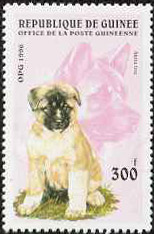
Four cases of aggression and hypothyroidism in dogs
Hormone treatment decreases aggression in dogs with hypothyroidism
source: J. Fatjo et al
Veterinary Record vol 151 no 18, November 2 2002
starts p547, 2 pages long
Hypothyroidism is the most common canine endocrinological problem that vets see, while aggression is the most common behavioural problem. Hypothyroidism can lead to lethargy, apathy, and not being able to tolerate cold, but some dogs may become more excited, and even aggressive. This study describes four cases of dogs treated for hypothyroidism which was linked to aggression.
Three dogs of the four showed dominance-related aggression, eg when disturbed during a meal, while the fourth showed fear aggression towards strangers. The aggression in all these cases had been noted over a long period, and had worsened. The dogs underwent thyroid function tests which suggested hypothyroidism. The dogs were given levothyroxine at 12 hour intervals, and owners advised to ensure that the dogs were not exposed to situations that could trigger aggression. The dogs' doses were adjusted after periodical measurements of their thyroid hormone levels. All four showed improvement after eight months, though three of the dogs showed more improvement than the fourth.
Hypothyroidism is estimated to account for 1.7% of canine aggression cases, so testing for hypothyroidism is indicated if dogs show aggression. Endocrinologists tend to prefer tests measuring thyroxine levels with concentration of endogenous thyroid-stimulating hormone.
Serotonin turnover can be affected by hypothyroidism, and serotonin is involved in aggression control. Canine dominance aggression has been linked to low brain serotonin levels. Aggression thresholds could be reduced by hypothyroidism. One dog also growled when alone, and was reported to have suffered seizures. A previous report noted a dog suffering from both seizures and hypothyroid aggression.
DO,BT


